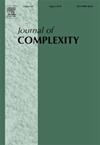若干Lebesgue测度为0的线性集的填充函数
IF 1.8
2区 数学
Q1 MATHEMATICS
引用次数: 0
摘要
我们利用Minkowski可测性的一个表征,研究了Minkowski维数d∈(0,1)的实线切出子集上的最佳填充的渐近性。我们的主要结果证明了Minkowski可测性是这些集合单调重排上存在最佳填充渐近的充分条件。对于每一个这样的集合,主要结果提供了一个显式的比例常数pd,仅依赖于闵可夫斯基维d,它将其包装极限与闵可夫斯基含量联系起来。我们随后利用Digamma函数研究了d→1−时pd的极限值。本研究进一步提供了两个清晰的结果,说明了主要结果假设的必要性。最后,上述闵可夫斯基可测性的表征激励了无穷多子集和问题的渐近研究。本文章由计算机程序翻译,如有差异,请以英文原文为准。
On the packing functions of some linear sets of Lebesgue measure zero
We use a characterization of Minkowski measurability to study the asymptotics of best packing on cut-out subsets of the real line with Minkowski dimension . Our main result is a proof that Minkowski measurability is a sufficient condition for the existence of best packing asymptotics on monotone rearrangements of these sets. For each such set, the main result provides an explicit constant of proportionality , depending only on the Minkowski dimension d, that relates its packing limit and Minkowski content. We later use the Digamma function to study the limiting value of as . This study further provides two sharpness results illustrating the necessity of the hypotheses of the main result. Finally, the aforementioned characterization of Minkowski measurability motivates the asymptotic study of an infinite multiple subset sum problem.
求助全文
通过发布文献求助,成功后即可免费获取论文全文。
去求助
来源期刊

Journal of Complexity
工程技术-计算机:理论方法
CiteScore
3.10
自引率
17.60%
发文量
57
审稿时长
>12 weeks
期刊介绍:
The multidisciplinary Journal of Complexity publishes original research papers that contain substantial mathematical results on complexity as broadly conceived. Outstanding review papers will also be published. In the area of computational complexity, the focus is on complexity over the reals, with the emphasis on lower bounds and optimal algorithms. The Journal of Complexity also publishes articles that provide major new algorithms or make important progress on upper bounds. Other models of computation, such as the Turing machine model, are also of interest. Computational complexity results in a wide variety of areas are solicited.
Areas Include:
• Approximation theory
• Biomedical computing
• Compressed computing and sensing
• Computational finance
• Computational number theory
• Computational stochastics
• Control theory
• Cryptography
• Design of experiments
• Differential equations
• Discrete problems
• Distributed and parallel computation
• High and infinite-dimensional problems
• Information-based complexity
• Inverse and ill-posed problems
• Machine learning
• Markov chain Monte Carlo
• Monte Carlo and quasi-Monte Carlo
• Multivariate integration and approximation
• Noisy data
• Nonlinear and algebraic equations
• Numerical analysis
• Operator equations
• Optimization
• Quantum computing
• Scientific computation
• Tractability of multivariate problems
• Vision and image understanding.
 求助内容:
求助内容: 应助结果提醒方式:
应助结果提醒方式:


